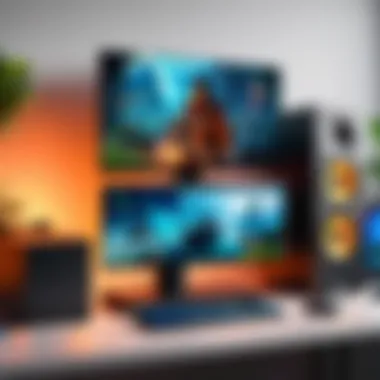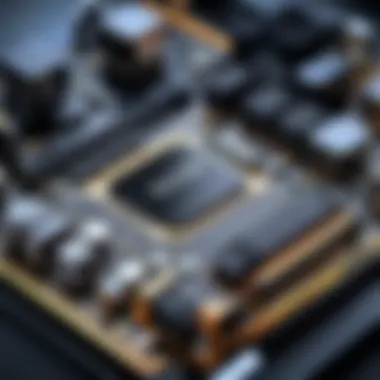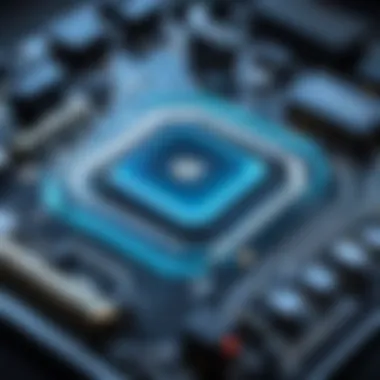Unveiling the Potential: Nintendo Games on the PC Platform


Product Overview
Nintendo Games on PC offer a potential revolution in gaming accessibility and experience. By exploring this crossover, we delve into a realm where two giants collide in the gaming sphere.
Brand Information
Nintendo, a renowned Japanese gaming company, is known for its innovative approach to game development and iconic franchises like Mario, Zelda, and Pokemon.
Key Specifications
The transition of Nintendo games to the PC platform involves adapting game controls, graphics, and performance to suit PC systems while maintaining the essence of gameplay.
Pricing
While the specifics of pricing for Nintendo games on PC are yet to be determined, it opens up avenues for revenue generation and market expansion.
Performance Comparison
Benchmark Tests
Testing the performance of Nintendo games on PC entails measuring frame rates, loading times, and overall gameplay smoothness compared to traditional gaming consoles.
Speed and Efficiency Comparisons
Assessing the speed and efficiency of Nintendo games on PC involves analyzing how well games run, optimize resource usage, and network connectivity.
Features and Technology
Unique Features
The integration of Nintendo games on PC may introduce cross-platform gameplay, possibly enhancing multiplayer and social gaming experiences.
Technological Advancements
This transition may unlock advanced graphics settings, higher resolutions, and faster frame rates that PCs can offer compared to consoles.
Compatibility with Other Devices


Nintendo games on PC may synergize well with various accessories and peripherals, leveraging the PC's versatility for enhanced gameplay.
Pros and Cons
Strengths of the Product
Nintendo games on PC could usher in a new era of gaming convergence, blending Nintendo's creative game design with the flexibility and power of PC hardware.
Areas for Improvement
Despite the exciting prospects, challenges such as optimization for diverse PC configurations, software compatibility issues, and piracy concerns may need addressing.
Value for Money
Cost-Effectiveness
Considering the potential cost of Nintendo games on PC versus traditional console purchases may provide gamers with more choices and cost-effective options for gaming.
Long-Term Benefits
Investing in Nintendo games on PC could lead to sustainable gaming platforms that continually evolve with technological advancements and user preferences.
Comparison with Similar Products
Comparing the value proposition of Nintendo games on PC with other gaming platforms could reveal compelling reasons for gamers to explore this new gaming landscape.
Introduction
Bringing Nintendo games to the PC platform is a hot topic among gaming enthusiasts and tech aficionados. This transition opens up a world of exciting possibilities and challenges, sparking intriguing discussions within the gaming community. As players seek more accessibility and versatility in their gaming experiences, the idea of Nintendo games on PC gains traction. This article aims to dissect the various facets of this potential shift, delving into the key elements, benefits, and considerations surrounding this subject.
Background of Nintendo Games
Nintendo, a pioneering player in the gaming industry, is renowned for its iconic game titles and beloved characters. From the legendary adventures of Mario to the epic journeys of Link in the Legend of Zelda series, Nintendo has captured the hearts of millions of gamers worldwide. The company's strict adherence to quality and innovation has set a benchmark in game development, creating a rich legacy that continues to influence the gaming landscape.
Rationale for Nintendo Games on PC
The transition of Nintendo games to the PC platform is motivated by the evolving needs and preferences of modern gamers. By making these beloved titles accessible on PCs, Nintendo can tap into a wider audience base and cater to the growing demand for diverse gaming experiences. Moreover, bringing Nintendo games to the PC platform allows for enhanced graphics, smoother gameplay, and potentially new features, enriching the gaming experience for players.


Significance of Gaming Industry Trends
The gaming industry is constantly evolving, driven by technological advancements, changing consumer behaviors, and market trends. In this dynamic landscape, the move to bring Nintendo games to PC aligns with the industry's push towards cross-platform compatibility and greater accessibility. By adapting to these trends, Nintendo can stay relevant in a competitive market and leverage new opportunities for engagement and growth.
Technical Feasibility
In the realm of exploring the potential integration of Nintendo games on the PC platform, the aspect of technical feasibility stands as a crucial foundation. This section dissect into essential elements concerning the possibility and practicality of such a transition. Understanding the technical aspects is paramount to grasp the complexities and nuances surrounding this proposal. Without a deep dive into technical feasibility, any discussion on maneuvering Nintendo games onto PCs would be surface-level at best, lacking the substantial analysis needed to gauge the viability of such a move effectively. Hence, this elucidation on technical feasibility paves the way toward a more informed and insightful discourse. It allows for a comprehensive examination encompassing hardware requirements, software compatibility, and system optimizations to ensure a seamless gaming experience on PC. Amidst the allure of having Nintendo games on PCs, delving into the technical terrain becomes imperative to navigate potential obstacles and pave the path for a potentially game-changing merger of two distinct gaming realms.
Compatibility Challenges
The landscape of compatibility challenges within the domain of integrating Nintendo games onto the PC platform presents a manifold of intricate factors that necessitate meticulous attention. Compatibility issues may extend beyond the simplistic hardware-software alignment, potentially delving into more profound realms of system architectures, prerequisites, and operational dependencies. An in-depth analysis of compatibility challenges serves as a crucial cornerstone in the deliberation of the amalgamation of Nintendo games and PC platforms. Only by addressing and resolving these compatibility challenges effectively can the vision of harmonizing these two gaming worlds come into fruition, providing gamers with unbridled access to a broader spectrum of gaming experiences previously segregated by platform distinctions. While these challenges may seem daunting, navigating through them with a methodical approach can pave the way for a seamlessly integrated gaming ecosystem, where boundaries between platforms blur to create a unified gaming landscape.
Emulation and Virtualization Solutions
The adoption of emulation and virtualization solutions emerges as a pivotal strategy in the discourse surrounding the accommodation of Nintendo games on the PC platform. Emulation and virtualization technologies offer a conduit to bridge the gap between proprietary Nintendo systems and the open architecture of PCs. By leveraging these advanced solutions, gaming enthusiasts can potentially transcend platform barriers, indulging in a diverse library of Nintendo games on their PCs. The implementation of emulation and virtualization not only enhances accessibility but also showcases the adaptability of modern technologies to cater to evolving consumer demands for a seamless and immersive gaming experience. Embracing emulation and virtualization solutions heralds a new era of experiential gaming, where boundaries dissolve, and possibilities expand beyond conventional constraints, propelling the gaming community into uncharted realms of innovation and engagement.
Performance Optimization Considerations
Delving into the sphere of performance optimization considerations sheds light on the critical need to streamline gaming experiences when merging Nintendo games with PC platforms. Performance optimization holds the key to ensuring that games run seamlessly, offering gamers a glitch-free and immersive gaming journey. Factors such as frame rates, graphic resolutions, and system resources play a pivotal role in determining the overall performance quality of Nintendo games on PCs. By meticulously fine-tuning these elements, developers can elevate the gaming experience to unparalleled heights, capturing the essence and magic of Nintendo games on a platform traditionally divergent from its original ecosystem. The pursuit of performance optimization underscores a commitment to excellence and user satisfaction, pushing the boundaries of gaming innovation and setting the stage for a harmonious coexistence of Nintendo games within the expansive realm of PC gaming.
Legal and Copyright Implications
In the realm of exploring the possibility of bringing Nintendo games to the PC platform, navigating the intricate landscape of legal and copyright implications stands as a paramount consideration. These aspects of the transition hold immense significance in understanding the feasibility and viability of such a movement. The intersection of intellectual property rights, licensing agreements, and regulatory compliance forms the backbone of this exploration.
Licensing Agreements
Delving into the realm of licensing agreements sheds light on the intricate structures that govern the usage and distribution of Nintendo games on the PC platform. Negotiating favorable terms and conditions in these agreements is vital to ensuring a smooth and legally sound transition. Factors such as territorial rights, revenue sharing models, and duration of agreements play a pivotal role in shaping the landscape of Nintendo games on PC.
Intellectual Property Protection
The safeguarding of intellectual property in the context of bringing Nintendo games to the PC platform holds paramount importance. Implementing robust strategies for protecting trademarks, copyrights, and patents is crucial in mitigating the risks of piracy and unauthorized usage. Building a solid framework for intellectual property protection ensures the sustainable growth and longevity of Nintendo games within the PC ecosystem.
Regulatory Compliance
Ensuring adherence to regulatory frameworks and legal requirements is a cornerstone of the transition of Nintendo games to the PC platform. Complying with industry standards, data protection regulations, and content rating guidelines is essential in fostering a trustworthy and compliant gaming environment. Navigating the complex web of regulatory compliance sets the stage for the seamless integration of Nintendo games into the PC gaming landscape.
Impact on Gaming Community


In the realm of gaming, the impact of introducing Nintendo games to the PC platform can be monumental. This section delves into the crucial role that this transition plays within the gaming community, sparking discussions and possibilities that resonate across gaming enthusiasts and tech aficionados. By exploring the fusion of Nintendo's iconic games with the versatility and accessibility of the PC platform, a new dimension of gaming experience emerges, promising enhanced engagement and immersion for players worldwide. The compatibility between Nintendo games and PC opens doors to new horizons, where players can enjoy their favorite titles on a familiar gaming platform, unlocking a plethora of benefits and stimulating insightful conversations within the gaming ecosystem.
Enhanced Accessibility for Players
Elevating accessibility for players stands as a cornerstone of the convergence between Nintendo games and the PC platform. The transition affords gamers the convenience of accessing beloved Nintendo titles without the restrictions of console-specific hardware. By breaking down barriers and enabling cross-platform compatibility, players can savor the magic of Nintendo games on their preferred devices, ensuring seamless gameplay experiences across various setups. This shift in accessibility not only increases player engagement but also fosters inclusivity within the gaming community, catering to a diverse audience eager to explore the rich gaming heritage of Nintendo.
Diversification of Gaming Platforms
The introduction of Nintendo games to the PC platform heralds a significant diversification in the gaming landscape. By bridging the gap between console-exclusive titles and PC enthusiasts, this shift broadens the spectrum of gaming platforms, offering a more extensive array of gaming experiences to players. The fusion of Nintendo's unique game catalog with the PC's adaptable environment introduces a dynamic blend of gaming styles and genres, enriching the overall gaming ecosystem with fresh perspectives and creative dimensions. This diversification not only enriches player choices but also spurs innovation and competition, nurturing a vibrant gaming market poised for continual evolution and transformation.
Community Feedback and Expectations
Central to the integration of Nintendo games on the PC platform are the voices and expectations of the gaming community. Engaging with player feedback and expectations is vital in shaping the direction and reception of this shift, ensuring that the transition resonates positively with gamers worldwide. By seeking input from the community, developers can tailor experiences to meet player demands, addressing concerns and incorporating valuable insights into the gaming landscape. This collaborative approach not only strengthens player-developer relationships but also cultivates a sense of shared ownership and involvement in the evolution of gaming technology, paving the way for a more inclusive and responsive gaming community.
Business and Market Considerations
In this article focusing on the exploration of bringing Nintendo games to the PC platform, the section of Business and Market Considerations plays a pivotal role in understanding the commercial aspects of this potential transition. The intersection of business and the gaming industry is not merely coincidental but crucial for assessing the viability and sustainability of such a strategic move. By delving into Business and Market Considerations, we aim to dissect the market dynamics, financial implications, and strategic elements surrounding the integration of Nintendo games onto the PC platform. Understanding the economic landscape and consumer behaviors within the gaming market becomes imperative in determining the feasibility of this venture. This section ventures into the complexities of market analysis, revenue projections, and competitive positioning necessary for Nintendo to navigate the evolving landscape of gaming business operations.
Revenue Generation Opportunities
Exploring the potential revenue generation opportunities resulting from the convergence of Nintendo games onto the PC platform opens up a new realm of financial possibilities for the gaming giant. With a wider reach and expanded audience base that the PC platform offers, Nintendo can capitalize on diverse monetization channels to enhance its income streams. From direct game sales to in-game purchases, downloadable content, subscription services, and licensing agreements, the avenue for revenue growth becomes multifaceted. By leveraging the compatibility and performance optimization measures discussed earlier in this article, Nintendo can enhance its revenue potential through tailored strategies that resonate with PC gamers while maintaining the essence of its iconic game titles.
Competitive Landscape Analysis
Analyzing the competitive landscape post the implementation of Nintendo games on PC unveils a nuanced perspective on the market positioning of the gaming company. By strategically assessing the strengths, weaknesses, opportunities, and threats posed by existing and potential competitors in the PC gaming sphere, Nintendo can fine-tune its market strategies. Understanding the market saturation, consumer preferences, pricing strategies, and promotional tactics of rival game developers and publishers becomes indispensable in carving out a sustainable competitive advantage. This section delves into the intricate details of the competitive landscape analysis, shedding light on the strategic moves required by Nintendo to navigate through the dynamic and fiercely contested PC gaming market effectively.
Monetization Models for Nintendo PC Games
The section on monetization models for Nintendo PC games provides a comprehensive insight into the diverse strategies available for the company to capitalize on its intellectual properties in the digital realm. From exploring freemium models to premium pricing structures, subscription-based services to microtransactions, and collaborative partnerships to exclusive content offerings, Nintendo can leverage an array of monetization models to drive engagement and enhance user experience on the PC platform. By meticulously analyzing the consumer behaviors, market trends, and technological advancements influencing the gaming industry, Nintendo can tailor its monetization strategies to meet the evolving demands of PC gamers while ensuring profitability and sustainability in the long run.
Future Outlook and Possibilities
The section 'Future Outlook and Possibilities' within this article intensively scrutinizes the imminent direction the gaming industry might steer towards regarding Nintendo games on the PC platform. This segment is pivotal as it forecasts the evolution anticipated in the gaming sector, specifically concerning Nintendo games intersecting with PC gaming technologies. By dissecting various possible outcomes through an analytical lens, we aim to pave the way for an informed discourse regarding the advancements and prospects awaiting gamers and industry stakeholders. This deliberation brings into focus the transformative impact such a convergence could have on the gaming landscape, thereby offering readers a detailed insight into the potential futures that await. It underscores the critical imperative of understanding and actively engaging with the evolving paradigms of gaming, foreseeing a harmonious integration of distinct gaming ecosystems.
Evolution of Gaming Technologies
Examining the 'Evolution of Gaming Technologies' unlocks a comprehensive analysis of the dynamic shifts shaping the contemporary gaming sphere. With a span of 250-300 words, this section meticulously evaluates the technological progressions driving innovation within the gaming realm. It delves into the intricacies of hardware and software advancements, elucidating the symbiotic relationship between evolving technologies and gaming experiences. Emphasizing the historical trajectory of gaming tech, this segment anticipates the future trends likely to redefine gameplay and immersive interactions. By exploring the convergence of cutting-edge technologies such as AI, VR, and cloud gaming services, this section offers a meticulous examination of the rapid evolution propelling the gaming sector forward while fostering anticipation for the forthcoming technological marvels set to revolutionize the gaming terrain.
Potential Collaborations and Partnerships
The segment on 'Potential Collaborations and Partnerships,' spanning a substantial 250-300 words, navigates the intricate network of alliances and synergies inherent in the gaming industry landscape. In this deliberation, we dissect the strategic significance of collaborations between gaming entities, technology firms, and other stakeholders in amplifying the scope and reach of gaming experiences. By offering an in-depth exploration of the collaborative undertakings that could materialize in the realm of Nintendo games on the PC platform, we shed light on the strategic alliances poised to redefine the gaming ecosystem. Through a nuanced analysis, we unveil the transformative impact of strategic partnerships in fostering innovation, driving market growth, and enhancing the overall gaming experience for enthusiasts and novices alike. This section presents a detailed examination of the nuanced alliances and collaborations crucial for shaping the future trajectory of Nintendo games on the PC platform, highlighting the transformative potential of strategic synergies and collaborative ventures.
Consumer Adoption Trends
Delving into 'Consumer Adoption Trends' offers a comprehensive overview of the behavioral patterns and preferences shaping consumer interactions with gaming technologies. Ranging between 250-300 words, this section meticulously analyzes the evolving consumer inclinations towards gaming platforms, with a specific focus on the adoption trends associated with Nintendo games on the PC platform. By scrutinizing the shifting paradigms of consumer behavior, this segment elucidates the factors influencing consumer decision-making processes and adoption rates within the gaming landscape. Through a meticulous examination of market trends, player preferences, and technological advancements, this section provides valuable insights into the evolving patterns of consumer adoption, anticipating the future trajectories of gaming consumption and engagement. By articulating a detailed narrative of consumer adoption dynamics, this segment aims to equip readers with a holistic understanding of the evolving preferences and trends driving consumer engagements within the dynamic gaming milieu.







